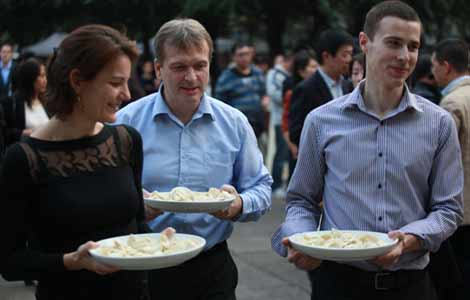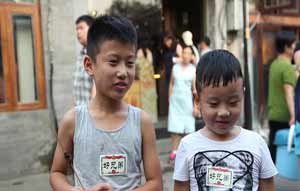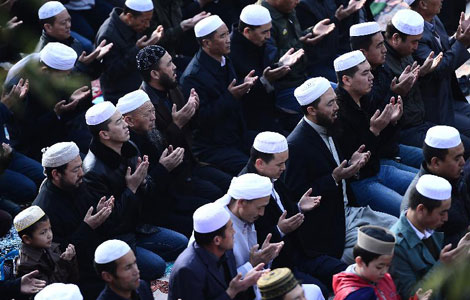Canton Fair to promote yuan use
Updated: 2013-10-14 23:53
By Qiu Quanlin and Yao Jing in Guangzhou (China Daily)
|
|||||||||||
|
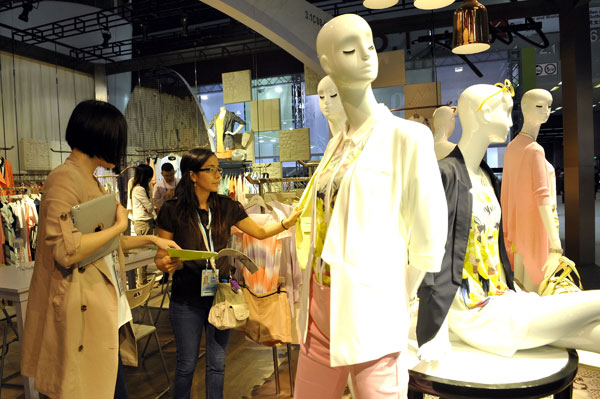 |
|
A buyer examines garments at the China Import and Export Fair in Guangzhou, Guangdong province. The fair, also known as Canton Fair, opens on Tuesday for its autumn session. Liang Xu / Xinhua |
Transactions during the China Import and Export Fair, the country's largest trade event, will be for the first time announced in the form of yuan settlement, organizers said on Monday.
"The move is part of an effort by the organizers to help accelerate the yuan's internationalization," said Liu Jianjun, spokesman for the fair and deputy director of the China Foreign Trade Center.
The 114th session of the twice-a-year fair, widely known as the Canton Fair, will open on Tuesday in Guangzhou, the capital of Guangdong province.
"Transactions conducted with yuan-denominated settlement will also help promote the yuan business of Chinese exporters during the fair. It will help avoid losses caused by a stronger yuan," Liu said.
The yuan strengthened to a 20-year high after the central bank set the currency's reference rate at a record high. The People's Bank of China raised its daily fixing by 0.08 percent to 6.1406 per dollar, the strongest since a peg to the greenback was lifted in July 2005.
A growing number of Chinese companies, such as Gree Electric Appliances Inc, one of the country's biggest home appliance manufacturers and exporters, have become keen on using yuan settlements.
"Yuan settlements in trade are welcomed, as they help avoid risks caused by the stronger yuan. We are going to use more yuan settlements in overseas markets," Zhang Zhenghu, deputy general manager of the overseas sales branch of Gree, told China Daily.
Guangdong-based Gree conducted its first overseas yuan-denominated deal, valued at $500,000, in Brazil in 2011, according to Zhang.
"Deals conducted using yuan settlement are still small for us. But we are going to promote more use of yuan payments in overseas markets in the years ahead, given that the value of the currency is still rising," Zhang said.
The stronger yuan, combined with a complex global trade situation, has squeezed profits for a growing number of Chinese companies, according to Zhang.
"Yuan appreciation is a heavy burden for most Chinese exporters. We had to increase prices to make a sustainable business profit in overseas markets," said Zhang.
Zhang Xialing, deputy director of the foreign trade department at the Ministry of Commerce, said at an earlier financing forum in Guangzhou that Chinese exporters need to conduct more deals using the yuan to avoid currency risks.
Not many trades were settled in yuan during the last session of the Canton Fair, according to the event's organizing committee.
"More use of yuan settlements in trade will help Chinese exporters reduce risks and hasten the currency's internationalization," said Zhang.
Some 17,000 companies in Guangdong, which make up about a quarter of the country's foreign trade, have conducted yuan settlements with counterparts from 169 countries and regions since China launched the payment system in July 2009, according to the Guangzhou Branch of the People's Bank of China.
"Yuan settlements also play an important role for Chinese companies in their industrial upgrading, as it helps reduce business losses," Zhang from the Ministry of Commerce said.
Despite China's shrinking exports in September, a sign of lower global demand, the fair will still be a busy event.
The number of booths will be 59,539 at the fall session and 24,517 companies have confirmed participation, 229 less than in the spring session, the organizers said.
Liu Jianjun said the decline in the number of participants is mainly because of the weakening global economy. The fair's organizers are adjusting their strategies and trying to help more brand-name and big companies.
"China's foreign trade is undergoing a tough transition period, and we hope to support more potential companies to lead the whole upgrading of Chinese manufactures," said Liu.
"The number of buyers from emerging markets is expected to remain at the same level as the spring session," Liu said.
As for developed markets, Liu noted that the US economy has improved, so there will be somewhat more buyers from the US. Meanwhile, as China's trade with Japan has shown signs of picking up recently, there will be more buyers from Japan.
Related Stories
Yuan clearing bank in sight 2013-10-12 09:04
Have yuan, will travel far and wide 2013-10-14 06:32
Yuan to be fully convertible in the zone 2013-09-28 09:44
China to ease restrictions on yuan, investment, trade in Shanghai 2013-09-27 16:10
New yuan loan beyond expectation in August 2013-09-11 09:09
Today's Top News
Overseas M&A deals reach record high in 1st half
ODI set to become more diverse
Renewed move to streamline bloated sectors
Most EU urbanites breathe in pollution
Cooking fumes debated as cause of pollution
Agreements with UK to boost wider use of yuan
Nation honors father of Xi Jinping
$100b trade target for 2017
Hot Topics
Lunar probe , China growth forecasts, Emission rules get tougher, China seen through 'colored lens', International board,
Editor's Picks

|

|

|

|
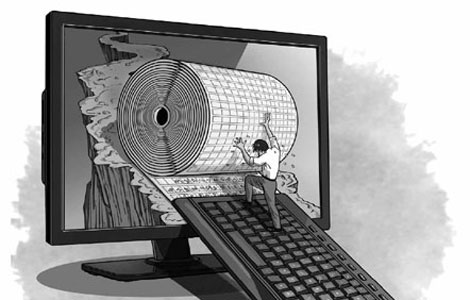
|

|
